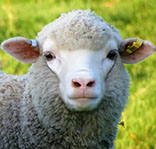
Around 1988 the Macauley Institute investigated the options for Scottish Shepard’s to develop their flocks to provide an economic return.
One area of their research was improving the fleece quality of local sheep. From this work ‘The Bowmont Sheep’ developed; taking the Saxon Merino and the local Shetland they developed a breed whose fleece was the finest of them all, at around 18 microns.
In the 17th & 18th centuries, all merino sheep belonged to King Ferdinand of Spain; they were considered treasures because they produced finer wool than any other breed of sheep. The Spanish merinos were exported to Ferdinand's cousin, Prince Xavier the Elector of Saxony, were they were selected and bred for that northern climate to produce the most exquisite and finest merino wool of the time, henceforth called Saxon Merino wool.
The Marino was then exported to Australia and North America; the Americans trying to feed a growing population bred for meat; however the Australian’s needed a product they could export, the logistics of which meant many months at sea. So with no refrigeration for meat, they continued the development of fine wools.

Bowmont Ewe Lambs

the finest, softest British wool was produced, a must try fleece for all spinners.
And it was from the Australian Saxon Merino the Macauley institute obtained the genetics for the Bowmont sheep.
Evidence indicates that small primitive sheep were farmed in the Scottish Isles some 4500, when the Vikings invaded they bought their own hardy breeds, and were they settled breeds adapted to the conditions, and so the Scottish breeds developed. Those developed on Shetland were small hardy sheep yet unlike many other breeds they had lovely soft wool; and this is the other set of genetics you have introduced.
With the majority of the genetics coming from the Marino, the main influence of the Shetland is its size, smaller than a typical Merino, but you can see the Saxon blood line, and hence its alternative name, the British Marino.
The aim to produce a fine spinning wool was a triumph; with this rare wool being much searched for and sort after by those who know a distinguished fleece when they feel one.




